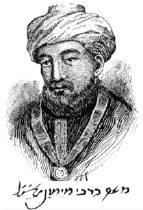 vs.
vs. 
In Pt 1, we saw how the
Mishnah has violated the Torah, and rewritten the Laws of the Ketoret in Ex 30.
9 Ye shall offer no strange incense thereon, nor burnt-offering, nor meal-offering; and ye shall pour no drink-offering thereon.
9 Ye shall offer no strange incense thereon, nor burnt-offering, nor meal-offering; and ye shall pour no drink-offering thereon.
34 And the LORD said unto
Moses: 'Take unto thee sweet spices, stacte, and onycha, and galbanum; sweet
spices with pure frankincense; of each shall there be a like weight.
The justification for this departure from Torah law is given, typically, by Maimonidean obfuscation. Thus in Hilchot Klei HaMikdash, Ch 2 he says the following:
The justification for this departure from Torah law is given, typically, by Maimonidean obfuscation. Thus in Hilchot Klei HaMikdash, Ch 2 he says the following:
Halacha 1
The incense offering was
prepared every year. Preparing it fulfills a positive commandment, as [Exodus 30:34] states: "And you
take spices...." Four of the spices are explicitly mentioned in the Torah.
They are balsum, onycha, storax, and frankincense. The others were communicated
as a halachah communicated to Moses at Sinai.
Halacha 2
[The requirement for] eleven
spices was communicated to Moses at Sinai. The would prepare them with an exact
weight and add to them - without weighing them: Salt of Sodom, Jordanian amber,
and an herb that would produce smoke. Only select people would know its identity
and that knowledge was conveyed as halachah from person to person.
Maimonides is relying on a
parallel universe “oral law” for which there is no evidence whatsoever in the
Torah. In fact, the Torah time and again refutes such lies.
The classical “proof “ the
rabbis cite is from Exodus 24:
12 And the LORD said unto Moses: 'Come up to Me into the
mount and be there; and I will give thee the tables of stone, and the law and
the commandment, which I have written, that thou mayest teach them.'
They claim that the law and
the commandment refer to the written and Oral laws respectively. They were to
sloppy, however, to even finish reading this verse, in the rush to come out
with a proof text, since it states “which I have written”.
A number of other proofs are
available that demonstrate that as far as God and Moses were concerned, there
was no Oral law. Thus:
Deut.
30;10: if thou shalt hearken to the voice
of the LORD thy God, to keep His commandments and His statutes which are
written in this book of the law; if thou turn unto the LORD thy God with
all thy heart, and with all thy soul.
Deut
27:3, And thou shalt write upon them all the
words of this law, when thou art passed over; that thou mayest go in unto
the land which the LORD thy God giveth thee, a land flowing with milk and
honey, as the LORD, the God of thy fathers, hath promised thee.
Josh 8: 32 And he wrote there upon the stones
a copy of the law of Moses, which he wrote before the children of Israel.
35 There was not a word of all that Moses commanded, which Joshua
read not before all the assembly of Israel, and the women, and the little ones,
and the strangers that walked among them.
These in general are
disproofs of any Oral Law, since for there to have been any oral law, these
verses would be redundant, God forbid.
Now, amongst the rabbis,
there is sometimes a dissenting voice in how to interpret the Torah. In the case
of the spices, it comes from Rashbam - Samuel ben Meir , the grandson of Rashi
and elder brother and teacher of Rabbi
Tam (called Rabbeinu by his followers).
Rashbam interprets the Torah
according to its plain and therefore most logical meaning. On Ex 30:34, he
interprets this as including only 4 ingredients, the first 3 being spices,
since they are punctuated by the word סַמִּים , spices, followed by the 4th ingredient, which
is translated as frankincense. This
contradicts not only the Rambam, but the Mishna as well.
As pointed out already, http://tanakhemet.blogspot.co.uk/2014/08/starnge-spices-pt-1.html
, the Mishna is in violation of the Torah in at least 3 major ways.
a) by bringing strange
incense
b) they use unequal weights
c) they bring drink offering!
b) they use unequal weights
c) they bring drink offering!
No comments:
Post a Comment